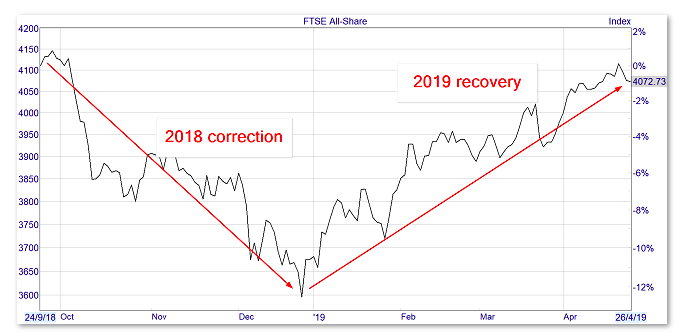For most investors 2018 was a year to forget and from peak to trough, the FTSE All-Share index lost about 16% of its starting value.
For many this was too much to take and several subscribers informed me of their decision to exit the stock market.
That may have been the right decision for them, but since the end of 2018 the market has done what it usually does after corrections and bear markets; it’s rebounded strongly.
For example, the FTSE All-Share is up more than 10% in the first quarter of 2019 alone, and is now only five percent or so below its previous all-time high.

This is normal.
Markets collapse and then they recover.
What matters is not the events, but your response to them.
And your response determines whether you’re thinking like a long-term investor or a short-term speculator:
- Speculators are focused on short-term prices and they sell when prices are falling
- Investors are focused on long-term value and they buy when prices are falling
This constant push and pull between those who are focused on short-term prices and those who are focused on long-term values is what makes the market very efficient, but it’s also what makes the market very volatile.
Another way to think about this is in terms of patience.
Many (but not all) investors who sell during corrections and are impatient.
They expect to see good results year-in and year-out, or even month-in and month-out.
If prices decline for a few weeks or months then they’ll sell up and move on to a new investment which they hope will always go up and never go down.
No such equity investment exists, so in reality the impatient investor ends up buying at the top when everything’s going up and selling at the bottom when everything’s going down.
Patient investors sees things differently.
They know the stock market can suffer short-term declines and they don’t expect to make money every single year.
They also know the stock market is very likely to perform well over the long-term, and if they’re patient during declines then the market should eventually reward that patience.







